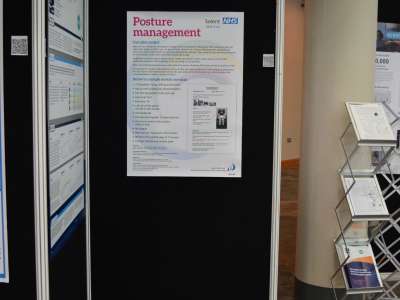
The article details how an attendee at PMG 2016 put her learning into clinical practice.
As a community-based Occupational Therapist (OT) who is new to the role of working with children with physical disabilities, I was thrilled to be given the opportunity to attend the PMG Conference 2016. Having worked in mental health settings prior to my current post, I am still learning a great deal about postural management and mobility. At the conference, in order to inform my future practice, I chose to attend sessions that would develop my understanding of the role of wheelchair services, joint-working and child-centred care.
I attended a session on joint-funded seating which convincingly argued that increased information-sharing between services minimises repetition of assessments, and improves client-centred care and healthcare plans. I learned how my role as a community-based children’s OT compliments the role of OTs based in wheelchair and social services. It also raised my awareness of the importance of agreeing responsibilities for repair and maintenance of any equipment issued.
The session Case study of a child with SMA: powered wheelchair assessment and drive controls by Vicky Curling and Rebecca Hindle was particularly helpful for me due to the clarity of clinical reasoning for equipment provision. The clearly illustrated journey from assessment to intervention, including a thorough handover in the presence of community therapists like myself, and family, was of particular interest to me in terms of maximising quality of care and long-term positive outcomes. My learning from attending the sessions was applied when working with a child on my caseload as detailed in the case-study below.
I arranged a joint-home visit with wheelchair services for assessment of a wheelchair-mounted assistive device to facilitate a child’s upper limb function. Attendance at the above sessions shifted my considerations of joint-working as merely ‘good practice’ to reasoning what the potential impact may be on the child, equipment, family, home and support services if I did not involve wheelchair services in the assessment. What I learnt at the sessions also helped me to apply a holistic approach to assessing suitability of the device, considering the child, school and home environment and occupations.
I was primed to consider how the equipment may impact upon use of the chair in regards to additional weight and width. This led to discussions with wheelchair service colleagues on manoeuverability through doors and using ramps, also liaising with a housing OT regarding additional weight and use of a through-floor lift. I also felt confident agreeing who would be responsible for funding and maintenance of the new equipment, and what to do in case the wheelchair was affected by installation.
When considering the impact the new equipment would have on family, carers and support staff in school, such as their ability to safely install the equipment, I also applied what I had learnt from the well-presented Posture management care plan project poster by Sarah Jamieson (illustration above of Sarah's poster displayed at PMG Conference 2016. Photograph courtesy of Suzie Hunt). The poster served as inspiration for me to produce a visual care plan detailing how and when the equipment should be used safely in the home and in school.
I believe that had I not been able to attend conference via the bursary award, my assessment of the additional equipment and consequent follow-up would have been much narrower in scope, and the outcomes for the child and supporting adults would have been more limited. Attendance at conference has therefore greatly improved my confidence and the quality of my practice. I would highly recommend practitioners new to this clinical area to attend conference and would like to thank all at PMG for facilitating my continued professional development in this area.






.jpg)



no comments
Add your comment...